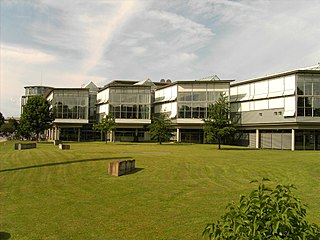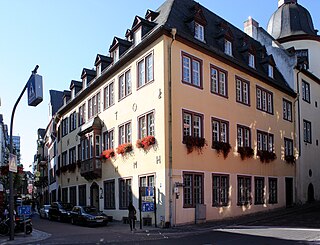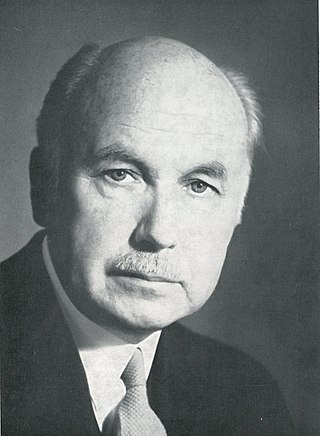
Rhineland-Palatinate is a western state of Germany. It covers 19,846 km2 (7,663 sq mi) and has about 4.05 million residents. It is the ninth largest and sixth most populous of the sixteen states. Mainz is the capital and largest city. Other cities are Ludwigshafen am Rhein, Koblenz, Trier, Kaiserslautern, Worms and Neuwied. It is bordered by North Rhine-Westphalia, Saarland, Baden-Württemberg and Hesse and by France, Luxembourg and Belgium.

North Rhine-Westphalia or North-Rhine/Westphalia, commonly shortened to NRW, is a state (Land) in Western Germany. With more than 18 million inhabitants, it is the most populous state in Germany. Apart from the city-states, it is also the most densely populated state in Germany. Covering an area of 34,084 square kilometres (13,160 sq mi), it is the fourth-largest German state by size.

The Sieg is a river in North Rhine-Westphalia and Rhineland-Palatinate, Germany. It is a right tributary of the Rhine.

The Rhine-Neckar Metropolitan Region, often referred to as Rhein-Neckar-Triangle, is a polycentric metropolitan region located in south western Germany, between the Frankfurt/Rhine-Main region to the North and the Stuttgart Region to the South-East.

The Göttingen State and University Library is the library for Göttingen University as well as for the Göttingen Academy of Sciences and is the state library for the German State of Lower Saxony. One of the largest German academic libraries, it has numerous national as well as international projects in librarianship and in the provision of research infrastructure services. In the year 2002, the SUB Göttingen won the German Library of the Year award. Its current director is Wolfram Horstmann.

The Berlin-Brandenburg capital region is one of the most prolific centers of higher education and research in the world. It is the largest concentration of universities and colleges in Germany. The city has four public research universities and 27 private, professional and technical colleges (Hochschulen), offering a wide range of disciplines. Access to the German university system is tuition free.
The Trier University of Applied Sciences is one of the largest Universities of Applied Sciences in Rhineland-Palatinate with approximately 6000 students, around 170 professors and around 700 academic and nonacademic staff. It is spread over three campuses in Trier, Birkenfeld, and Idar-Oberstein. It is a member of the European University Association (EUA).
vascoda was, until 2011, a German web portal which offered access to scientific information in various disciplines. The name vascoda is often associated with the medieval explorer Vasco da Gama, as this implies the connotation of navigating the sea of information. Initially, though, “vascoda“ is a made-up word created by an agency for naming and branding.
The Hochschule Konstanz, is a German university located in Konstanz, Baden-Württemberg, Germany, in southern Germany close to the border with Switzerland. The university is a member of Internationale Bodensee-Hochschule.
The Hochschule für Musik Mainz is a university of music, part of the Johannes Gutenberg University of Mainz. It is the only such institution in the German state of Rhineland-Palatinate.

The University of Applied Sciences Ludwigshafen is a public university located in Ludwigshafen, Germany. It was founded in 1965 as Higher School of Commerce Ludwigshafen. In 1971 it became part of the University of Applied Sciences Rhineland Palatinate, which split up into seven autonomous universities in 1991.

The Frankfurt University Library is the library for the Goethe University Frankfurt, Germany.

The Stuttgart Media University or Media University is a state university of media studies in Stuttgart, Germany, offering nearly 30 accredited bachelor's and master's degree programs within three faculties.

Eveline Lemke is former German politician and member of the Alliance 90/The Greens. From 18 May 2011 until 18 May 2016, she was vice minister president of Rhineland-Palatinate and Minister for Economics, Climate Protection, Energy and Regional Planning. On 27 March 2011, she was elected into the Landtag of Rhineland-Palatinate. She was the leading candidate for her party in the 2016 Rhineland-Palatinate state elections along with The Greens faction leader in the Landtag, Daniel Köbler, after having been leader of the party since 2006. As vice minister Lemke represented the state of Rhineland-Palatinate in the German Bundesrat. As author and speaker in green technological issues and Circular Economy, she founded Thinking Circular in 2017. This thinktank is listed in the Sustainable Development Goals Help Desk, a platform by the United Nations since July 2018. She is also working as consultant together with Prof. Michael Braungart, chemist and inventor of the design philosophy Cradle-to-Cradle, Martin Lees and David Wortmann (DWR-Eco-Innovation-Alliance).

Hochschule für Gesellschaftsgestaltung is a private non-profit university situated in Koblenz, a city at Moselle and Rhine. While officially recognised in May 2015 as one of nine universities in the German state of Rhineland-Palatinate, it was founded in February 2014 by a group of academics, students and citizens. One of the institutions involved in the founding of Cusanus Hochschule has been the Kues Academy for the History of European Thought. Hochschule für Gesellschaftsgestaltung remains independent of economic, political and religious interests. Hence, it is not affiliated with any religious denomination.

Wörth (Rhein) station—originally Wörth (Pfalz)—is the most important station of the town of Wörth am Rhein in the German state of Rhineland-Palatinate. Deutsche Bahn classifies it as a category 5 station and it has five platforms. The station is located in the area of the Karlsruher Verkehrsverbund and it belongs to fare zone 540. Since 2001, Verkehrsverbund Rhein-Neckar (VRN) tickets are also accepted for travel to or from the VRN area. The address of the station is Bahnhofstraße 44.

The Technische Hochschule Ostwestfalen-Lippe is a state tech university in the Ostwestfalen-Lippe area in Lemgo, which is part of North Rhine-Westphalia. Additional campuses are in Detmold and Höxter. About 6,600 students work closely with 173 professors and about 550 other staff members in research, teaching and administration.

Paul Luchtenberg (1890–1973) was a German cultural scientist, educator and politician for the Free Democratic Party, as well as Culture Minister for North Rhine-Westphalia.
















